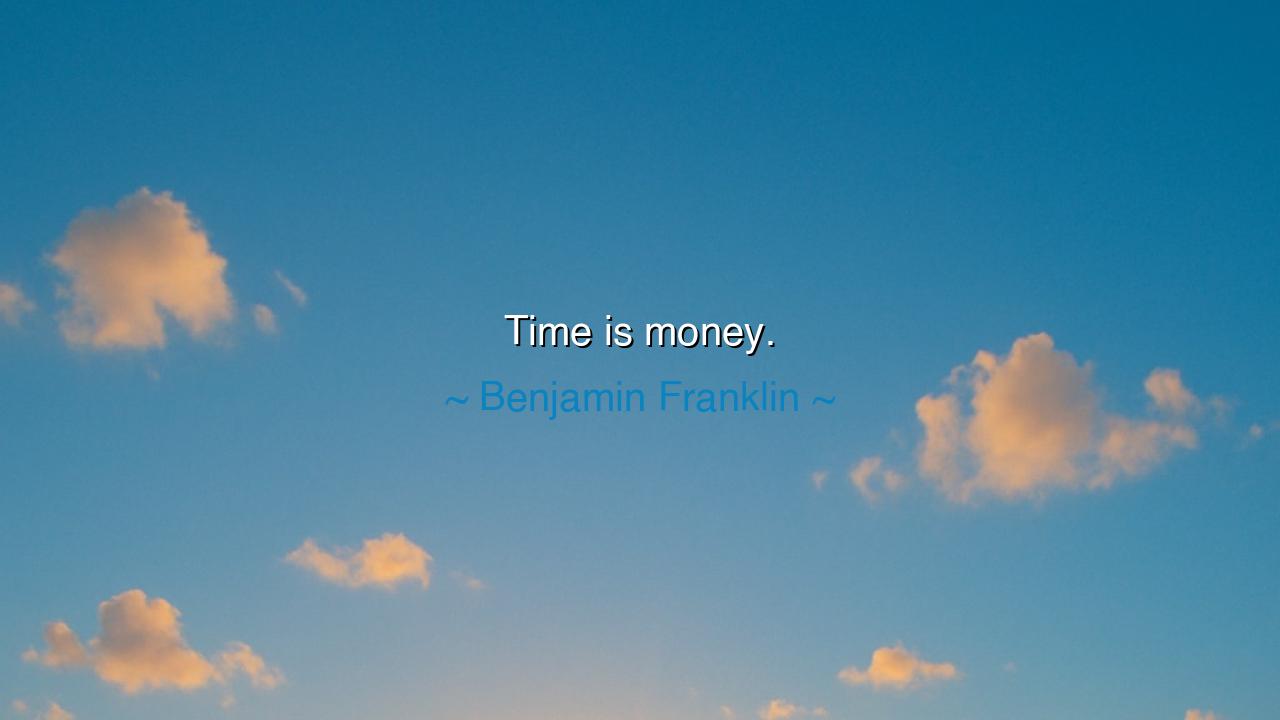
Time is money.






Hear, O seekers of wisdom, the sharp and enduring words of Benjamin Franklin: “Time is money.” This phrase, so simple in its form, resounds with the strength of a commandment. It is not merely a saying about wealth, but a vision of life’s most precious treasure—time—and how it may be transmuted into value. Franklin, sage of America, who rose from humble printer to statesman, knew that the minutes squandered could not be reclaimed, just as coins once cast aside are lost to the purse. He clothed this truth in plain words, that even the common man might understand: to waste time is to waste life itself.
The origin of this saying is found in Franklin’s essay Advice to a Young Tradesman, where he urged diligence and industry upon those who sought prosperity. In an age when a man’s labor was the coin by which he survived, Franklin saw clearly that each idle hour was not only a missed chance for earning but a wound upon character. Yet beyond trade and commerce, this saying rises into philosophy: it reminds us that all endeavors—be they of the mind, the heart, or the spirit—require the wise use of time, for it is the seed from which all harvests grow.
Consider the story of Thomas Edison. His genius was not in brilliance alone but in relentless labor. He guarded his hours as a miser guards his gold, working through nights, testing thousands of filaments until the electric light was born. Each fragment of time, wisely invested, became wealth beyond measure—not merely for himself, but for all humanity. Edison proved Franklin’s truth: to waste the hours is to impoverish the future; to use them well is to enrich eternity.
Yet beware, my children, lest you mistake this teaching for greed. Franklin’s cry that “Time is money” does not mean that all must chase silver and gold without rest. Rather, it is a summons to respect time as the currency of existence. One may spend it on labor, one may spend it on love, one may spend it on learning, but in all, one must spend it wisely. The fool who casts it away gains nothing, while the wise one who invests it finds their life multiplied in fruitfulness.
See how even in history this law governs nations. Japan, after the devastation of war, rose swiftly because its people treated every hour as a jewel. With discipline, they turned small moments into grand achievements, lifting their land from ruin to prosperity. Meanwhile, empires that wasted time in complacency and idleness faded into dust. Thus, Franklin’s words ring not only for individuals, but for peoples: squander not the hours, lest your nation too decline.
The lesson, then, is clear: treat your time as the most precious of currencies. Guard it against thieves of idleness and distraction. Invest it in labor that brings fruit, in relationships that endure, in wisdom that enlightens. Ask yourself each day: am I spending my time in ways that enrich my soul and strengthen my world, or am I scattering it as a careless gambler throws away coins?
Practical actions are simple but mighty. Rise early and claim the dawn as your own. Mark your hours, that they not vanish unnoticed. When you work, work with focus; when you rest, rest with peace; when you love, love with fullness. Keep account of your time as carefully as the merchant keeps account of his coin, for both determine the wealth of life.
Thus, let Franklin’s truth echo in your heart: “Time is money.” To waste it is poverty; to treasure it is prosperity; to invest it wisely is to build not only wealth of the hand, but wealth of the spirit. Let your days be coins well-spent, and your life shall be a treasury that no thief nor rust can consume.






AAdministratorAdministrator
Welcome, honored guests. Please leave a comment, we will respond soon